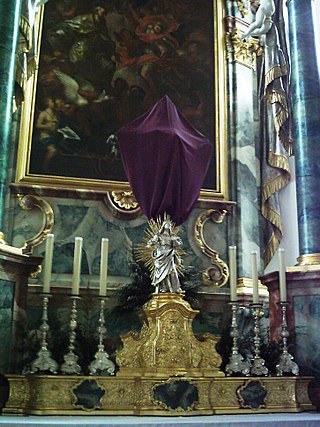Top Qs
Timeline
Chat
Perspective
Passion Sunday
Fifth Sunday in Lent From Wikipedia, the free encyclopedia
Remove ads
Passion Sunday is the fifth Sunday in Lent in several Christian traditions, marking the beginning of Passiontide. In 1969, Passiontide was removed from the liturgical calendar of the Western Catholic Church for the Mass of Paul VI, but it is still observed in the Traditional Latin Mass and in the Anglican Use. It is also observed by some Anglicans and Lutherans.
Remove ads
Fifth Sunday in Lent
Summarize
Perspective

Until 1959, the fifth Sunday in Lent was officially known in the Roman Catholic Church as “Passion Sunday”.[2] It marked the beginning of a two-week-long period known as Passiontide, which is still observed by Catholics who attend the Traditional Latin Mass or Anglican Ordinariates, as well as Western Rite Orthodox Christians, and various denominations in Protestantism.
In 1960, Pope John XXIII's Code of Rubrics changed the name of that Sunday to “First Sunday of the Passion”,[3] bringing the name into harmony with the name that Pope Pius XII gave five years earlier to the sixth Sunday in Lent, “Second Sunday of the Passion or Palm Sunday”.
Pope Paul VI in 1969 removed a distinction that existed (although with overlap) between Lent and Passiontide, which began with the fifth Sunday in Lent. The distinction, explicit in the 1960 Code of Rubrics,[4] predates it.[5] He deleted the reference to the Passion from the fifth Sunday in Lent.
Although Passiontide as a distinct liturgical season was abolished, the Roman Rite liturgy continues to bring the Passion of Christ to mind, from Monday of the fifth week in Lent onward, through the choice of hymns, the use on the weekdays of the fifth week of Lent of Preface I of the Passion of the Lord, with Preface II of the Passion of the Lord being used on the first three weekdays of Holy Week, and the authorization of the practice of covering crosses and images from the fifth Sunday in Lent onward, if the Conference of Bishops so permits. Where this practice is followed, crucifixes remain covered until the end of the Good Friday celebration of the Lord’s Passion; statues remain covered until the Easter Vigil.[citation needed]
The entrance antiphon of the Mass on the fifth Sunday in Lent begins with the word "Iudica" (older spelling, "Judica"). This provides another name for the day: "Iudica Sunday" or "Judica Sunday",[6] similar to the name "Laetare Sunday" for the fourth Sunday. Due to of the custom of veiling crucifixes and statues before Mass on the fifth Sunday in Lent, this Sunday was called “Black Sunday” in Germany where the veils were black, which elsewhere were generally purple.[7]
Those who continue to observe earlier forms of the Roman Rite or of liturgies modelled on it refer to the fifth Sunday in Lent by one or other of its previous names.
Lutheran readings
The historical readings for the fifth Sunday in Lent in the Lutheran tradition are Genesis 12:1–3, Hebrews 9:11–15, John 8:46–59, and Psalm 43. I Corinthians 1:21–31 and Matthew 26:17–29 are alternate readings.[8]
The three-year lectionary appoints the following readings for the fifth Sunday in Lent:[9]
Remove ads
Sixth Sunday in Lent
In the Roman Rite, the Gospel reading at the Mass of the sixth Sunday in Lent is an account in one of the Synoptic Gospels of the Passion of Christ. Until 1969, the lesson was always the account from the Gospel of Matthew: the whole of chapters 26 and 27 (Matthew 26:1–27:66).[10] In the 1955 reforms, this was trimmed to Matthew 26:36–27:60 while for priests celebrating a second or a third Mass on that day, to just Matthew 27:45–52 .[11] Since 1970, the revised Roman Missal has been using a three-year cycle in which the accounts of Matthew (26:14–27:66 or 27:11–54), Mark (14:1–15:47 or 15:1–39) and Luke (22:14–23:56 or 23:1–49) are alternated in successive years.[12]
Until 1954, the official name of the sixth Sunday in Lent was simply “Palm Sunday”.[13] In 1955, the name became for 15 years the “Second Sunday of the Passion or Palm Sunday”.[14] Since 1970, it has been “Palm Sunday of the Passion of the Lord”.[15]
Remove ads
Food
In the north of England and parts of Scotland, it is a tradition to eat carlin peas on this day.[16][17]
References
Wikiwand - on
Seamless Wikipedia browsing. On steroids.
Remove ads

